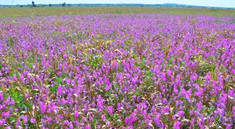Can Genome Editing Drive Food Security in Africa?
Can Genome Editing Drive Food Security in Africa?
Prof. Steven Runo
Kenyatta University Nairobi, guest professor at BOKU University, winter term 2025.
A public lecture on Dec. 2, 2025 @ BOKU University.
Hosted by BOKU University and Gregor Mendel Society Vienna.
- Recording (mp4) (82 minutes including discussion, 242 MB)
- Slides (pdf) (31 slildes, 79 MB)
Steven uses genomics tools to improve African crops. One of his success stories is resistance to Striga, also known as witchweed, a highly damaging parasitic weed threatening the livelihoods of smallholder farmers. In recognition of his contributions to science, Steven Runo was awarded the Royal Society Africa Prize in 2020.
Abstract:
Genome editing holds significant promise for addressing persistent food insecurity in Africa, particularly through improved management of pests and diseases. Our research focuses on conferring resistance in cereal crops to Striga, a parasitic weed that infests an estimated 40 million hectares of farmland and threatens the livelihoods of over 300 million smallholder farmers across sub-Saharan Africa.
Our approach targets the biochemical communication between host crops and the parasite by redirecting metabolite flux. Central to this strategy are strigolactones (SLs)—plant hormones secreted by roots to attract beneficial soil microbes. Unfortunately, these same molecules also stimulate Striga seed germination, triggering its parasitic lifecycle.
Building on a validated model in sorghum—where a mutation in a key strigolactone biosynthesis gene shifts production from the highly potent 5-deoxystrigol to the less active orobanchol—we have extended this genome editing strategy to other staple cereals, including maize, rice, and millets. Our development of gene-edited, Striga-resistant sorghum demonstrates both proof of concept and the potential for broader application across crops and regions.
However, translating such scientific breakthroughs into tangible agricultural impact requires more than laboratory innovation. To position Africa for early and sustained success in agricultural genome editing, several critical components must be in place: strengthened local scientific capacity and infrastructure, supportive and efficient regulatory frameworks, responsible stewardship and licensing practices, and clear, transparent communication with stakeholders. Together, these elements will enable the development, adoption, and commercialization of home-grown genome-edited crops—driving the transformation of food systems across the continent.
Keywords: Gene-Edited Crops, Regulatory Readiness, Technology Adoption,
| Dateien |
|---|
|
Lecture by Steven Runo, Dec 2, 2025
GMS_Lecture_Vienna_20251202_Steven_Runo.mp4
Can Genome Editing Drive Food Security in Africa? |
|
Lecture Slides in pdf, copyright Steven Runo
GMS_Lecture_Vienna_20251202_Steven_Runo.pdf
Can Genome Editing Drive Food Security in Africa? |

